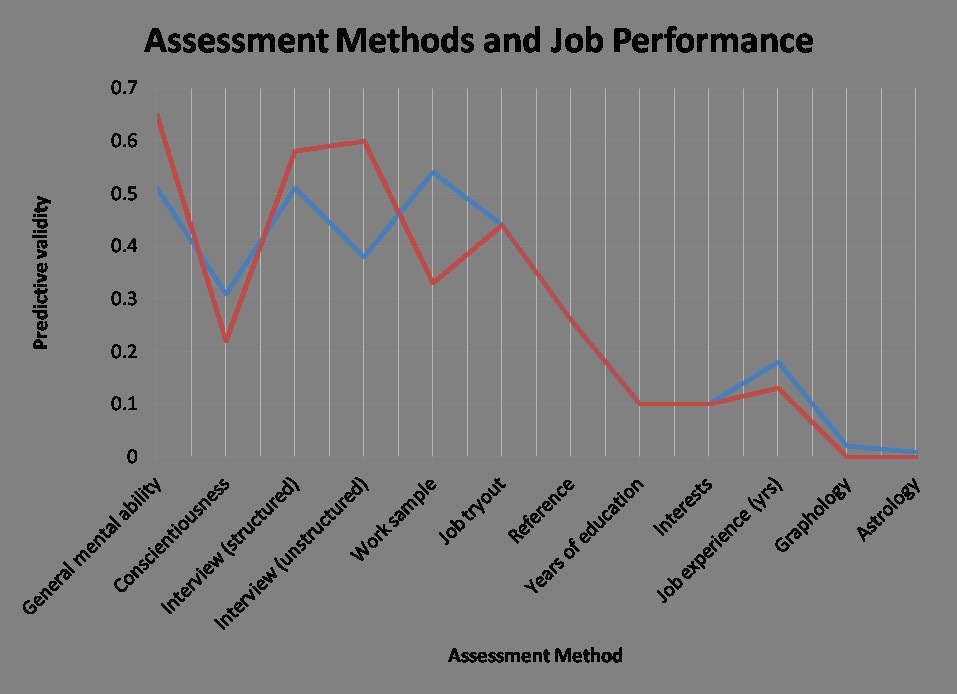🚫Why is Google not using brainteasers anymore, and we should not?
What companies are asking and why?
⁉️Why we have so many questions like: "Tell me about a time when...?" Or "What would you do if..?"
What is the most effective way to interview candidates?
Why does reference checks can explain only 7% of candidate performance?
🌟I am thrilled that companies are not asking anymore annoying: "How many golf balls would fit inside a 747?". Simple because they have little if any ability to predict how the candidate will perform in a job.
📰 Science behind it.
In 1998, Frank Schmidt and John Hunter published a meta-analysis of 85 years of research on how well assessments indicate performance. They looked at 19 different assessment techniques and found that typical, unstructured job interviews were pretty bad at predicting how someone would perform once hired. As well as brainteasers.
📉What do not work?
Unstructured interviews have an r2 of 0.14, meaning that they can explain only 14 percent of an employee's performance. This is somewhat ahead of reference checks (explaining 7 percent of performance), ahead of the number of years of work experience (3 percent), or handwritten analysis (0.04 percent). Does anyone use it?
📈 Well, what methods are the most effective?
Three assessment techniques were more effective than all others: work sample tests (29 percent), tests of general cognitive ability (26 percent), and structured interviews (26 percent). Google incorporated all three within and interview process.
1️⃣The best predictor of how someone will perform in a job is a work sample test (29 percent). This entails giving candidates a sample piece of work, similar to what they would do in the job, and assessing their performance. Even this can't predict performance ideally since actual performance also depends on other skills, such as how well you collaborate with others, adapt to uncertainty, and learn.
2️⃣The second-best predictors of performance are tests of general cognitive ability (26 percent). In contrast to case interviews and brainteasers, these are actual tests with defined right and wrong answers, similar to what you might find on an IQ test. They are predictive because general cognitive ability includes the capacity to learn, and the combination of raw intelligence and learning ability will make most people successful in most jobs. The problem, however, is that most standardized tests of this type discriminate against non-white, non-male test-takers (at least in the United States).
3️⃣Tied with general cognitive ability tests are structured interviews (26 percent), where candidates are asked a consistent set of questions with clear criteria to assess the quality of responses.
Two kinds of structured interviews: behavioral and situational.
Behavioral interviews ask candidates to describe prior achievements and match those to what is required in the current job (i.e., "Tell me about a time . . . ?"). Situational interviews present a job-related hypothetical situation (i.e., "What would you do if . . . ?"). A diligent interviewer will probe deeply to assess the integrity and thought process behind the candidate's stories.
The 'new' (red line) and old (blue line) results are illustrated in the graph below:
🔢Read a book by former Google’s Head of People Ops: Work Rules, chapter "Don't trust your gut."
👍🏻For more Google Insights, check out Work Rules! by Laszlo Bock, who heads up People Operations at Google.
👍🏻For more on study investigate Schmidt, F.L. & Hunter, J.E. (1998). The Validity and Utility of Selection Methods in Personnel Psychology: Practical and Theoretical Implications of 85 Years of Research Findings. Psychological Bulletin, 124(2), 262-274.




